September 1, 2025. Oceania Lecture Tour (3) Brisbane
Hello. Today marks the third stop of the Oceania lecture tour, where Sunim will hold a Dharma Q&A session for Korean expatriates in Brisbane.
After completing morning practice and meditation, Sunim had breakfast at the accommodation at 6 AM. He departed from the accommodation at 6:30 AM and headed to Auckland Airport. Sunim expressed his gratitude to Park Jeong-yoon for providing the accommodation.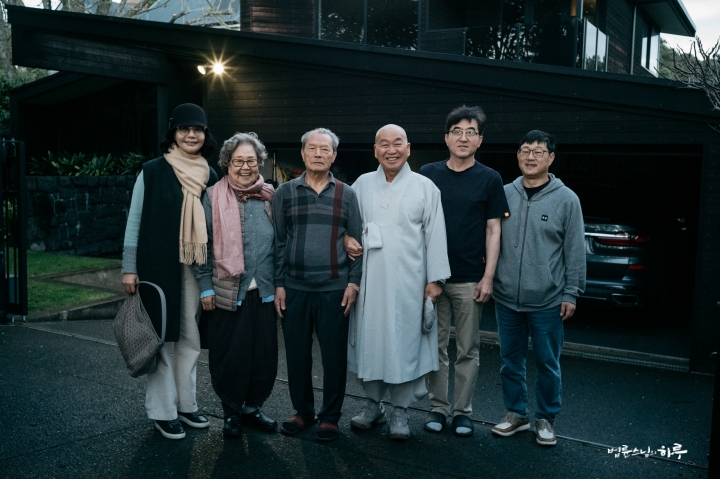
After completing departure procedures at the airport, Sunim took a commemorative photo with members who came to see him off.
“Thank you all for your hard work.” 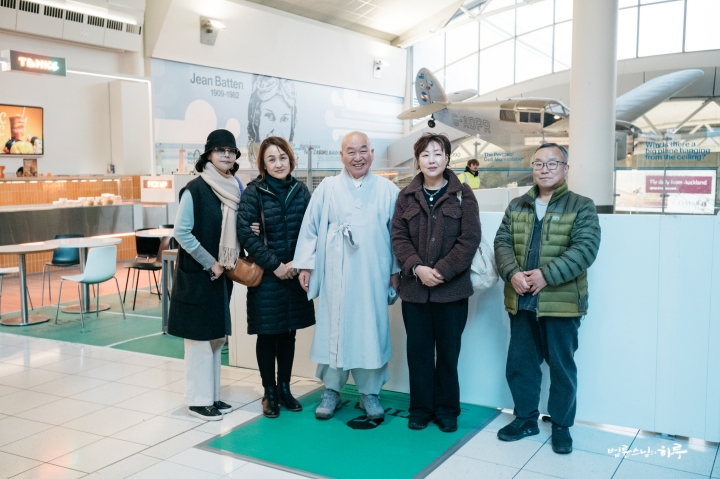
After exchanging farewells, Sunim headed to the boarding gate. The plane departed from Auckland Airport at 9:20 AM and arrived at Brisbane Airport at 11 AM local time.
Upon exiting the airport, members of Brisbane Jungto Society warmly welcomed Sunim.
“Welcome to Brisbane.”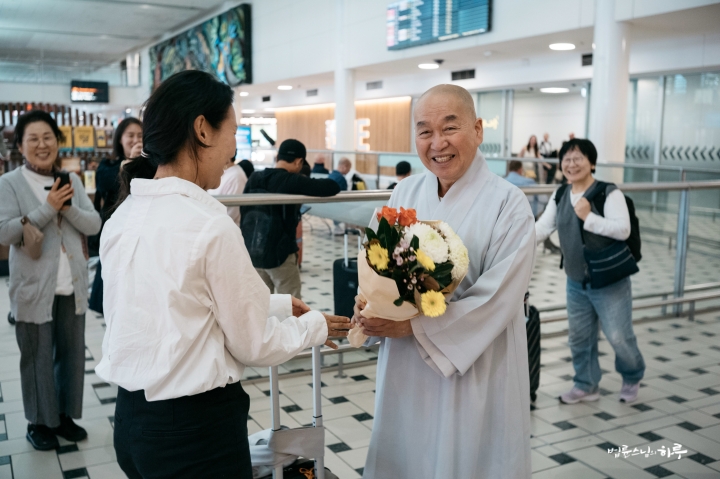
After exchanging warm greetings and taking a commemorative photo, they immediately headed to the accommodation.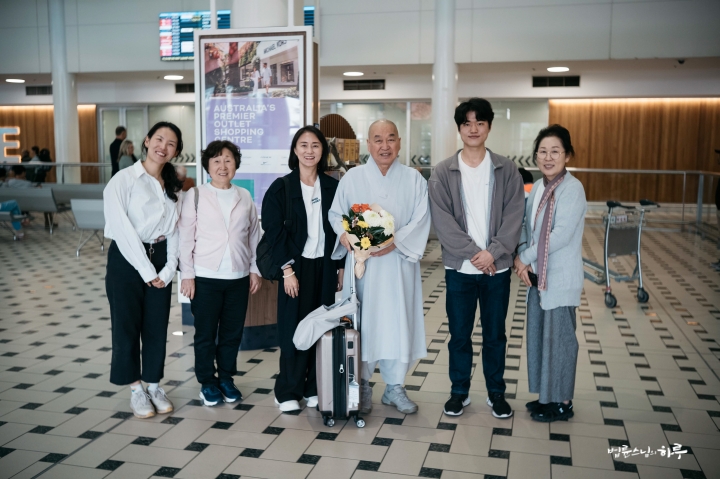
After a 30-minute drive from the airport, they arrived at the accommodation. Following lunch, Sunim handled business matters while communicating with Korea and took some rest.
As the sun set and 6 PM approached, Sunim headed to the lecture venue. After a 30-minute drive, he arrived at the venue.
Today’s lecture is being held at the Brisbane Technology Park (BTP) Center. This venue hosts various seminars, exhibitions, and trade shows in Brisbane, and today it’s hosting a Dharma Q&A session for Korean expatriates.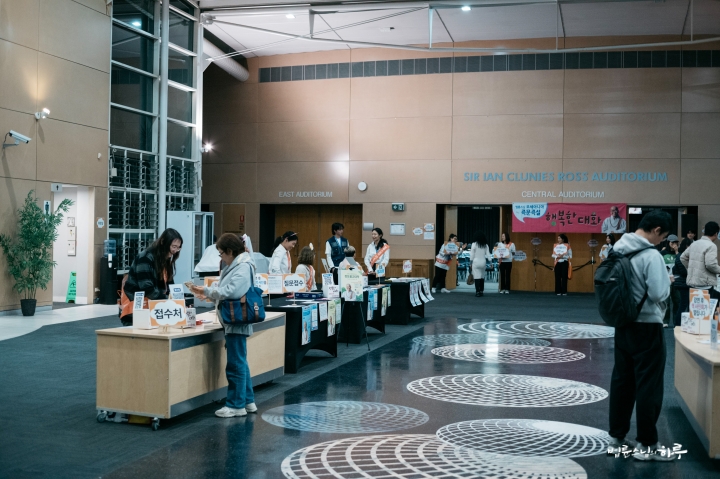
When Sunim arrived at the venue, volunteers were warmly welcoming the audience throughout the space. Many young people had come to attend the lecture.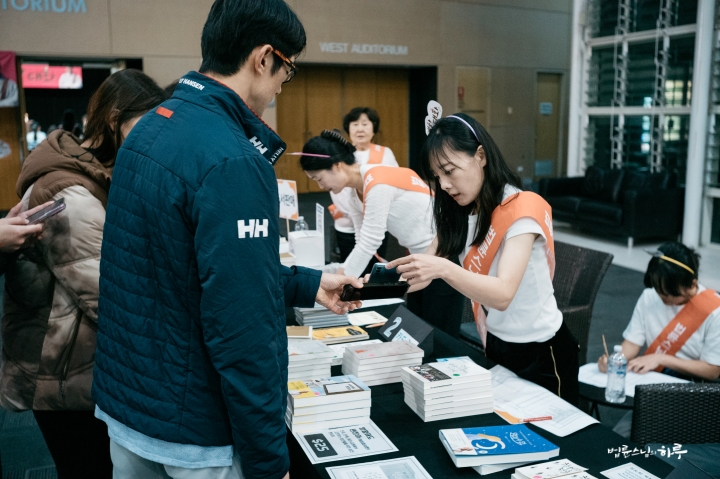
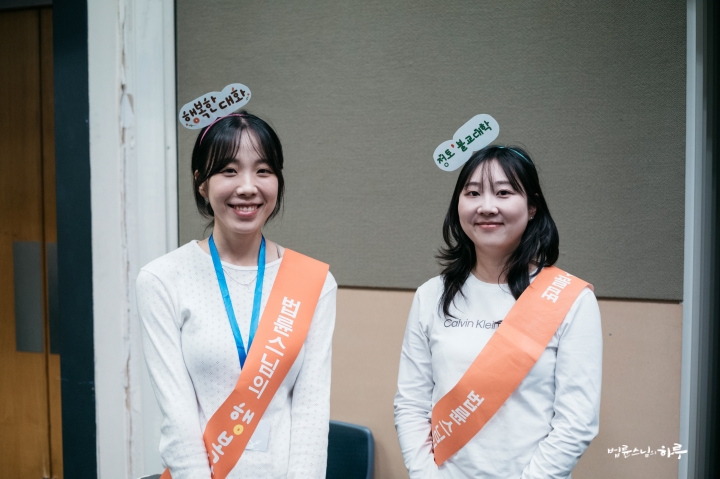
At 7 PM, Sunim took the stage before an audience of about 320 people. Enthusiastic applause and cheers filled the room.
Sunim smiled and gave his opening remarks.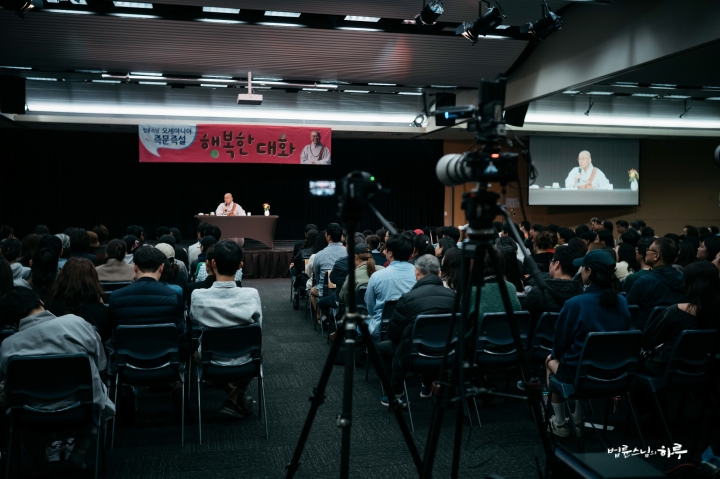
“Dharma Q&A is about having light conversations about various problems we face in life, like friends talking to friends. Through these conversations, you might think ‘Oh, it’s not such a big deal!’ or ‘I could do it this way!’ When that happens, we can say the problem has been resolved. There are no right answers in life. That’s why in Dharma Q&A, I don’t give specific answers. Some people keep saying ‘How does Sunim give such good answers?’ and call it ‘instant questions and answers,’ but I’ve never given answers. We just have conversations. During these conversations, people find their own solutions. So anyone can talk about any topic.”
Following this, seven people who had submitted questions in advance had conversations with Sunim. In the latter half of the lecture, four more people asked questions on the spot and engaged in dialogue with Sunim. Over the course of two hours, eleven people were able to ask Sunim questions. One of them sought Sunim’s advice on whether each small decision parents make for their children’s happy growth is right, and how to manage the anxiety that comes with it.
I’m Worried That My Small Decisions as a Parent Might Ruin My Child’s Life
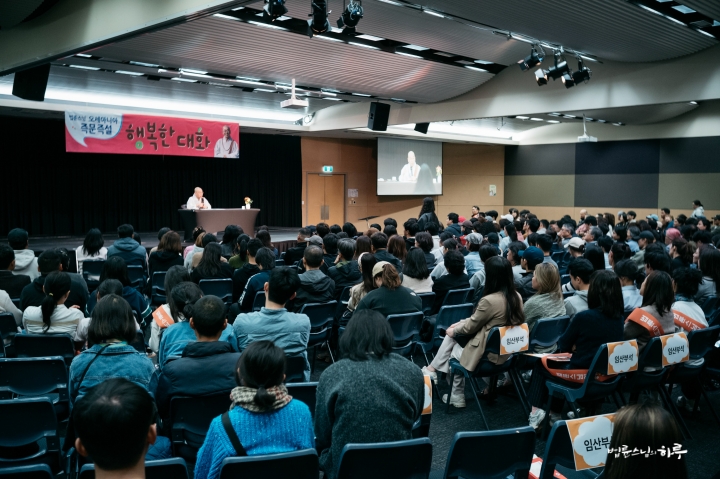
“Since you’re anxious and worried right now, your children will also be anxious and worried. You’re constantly being indecisive, unable to make decisions well, thinking ‘Should I do this or that?’, ‘Would it be better to do it this way or that way?’ And you regret your decisions after making them. But children learn exactly that while growing up under their mother’s care. So your children will also grow up with the tendency to endlessly worry like their mother: ‘Should I do this or that?’, ‘Should I go here or there?’, ‘Should I marry someone rich or someone handsome?’ They’ll resemble you. So looking at your current state, I can guess that your children probably won’t achieve very good results either.
When a dog raises puppies, does it worry about ‘How should I raise them to grow up like proper dogs?’ No, it doesn’t. It just raises them. It nurses them, protects them from other animals that might harm them, and that’s how puppies grow. Animals have one part that grows according to their genetic code, and another part where they learn by watching their mother’s behavior. Humans are similar. There’s a genetically determined part, and a part where they imitate what their mother does when they’re young. So if the mother’s psychology is comfortable, the child’s psychology also develops comfortably, and if the mother is anxious and worried, the child becomes anxious and worried too. If the mother views poverty as inferior, the child learns that too, and if the mother is overly concerned about appearance, the child develops an inferiority complex about their own appearance. They follow exactly.
If we divide the growth period, up to age 3 is when the ego is formed. During this time, the most important thing is not to teach something but to stabilize their psychology. If a grandmother raises them, the grandmother’s psychology needs to be stable; if a nanny raises them, the nanny’s psychology needs to be stable; if the mother raises them, the mother’s psychology needs to be stable. This is why the one who raises becomes the mother, not the one who gives birth. That’s why the primary caregiver’s psychology needs to be stable for the child, and it’s best when such a person provides warm care.
From age 4, they start learning by following based on that ego. The characteristic of children in kindergarten and elementary school is ‘imitation.’ They copy whatever they see around them. If mother speaks Korean, they speak Korean; if she likes kimchi, they eat kimchi. That’s why there’s an old saying: ‘You can’t even drink cold water carelessly in front of children.’ During this period, parents need to set an example. If you want your child to be frugal, parents must live frugally; if you want your child to be humble, parents must act humbly. Only when they see you treating your husband and mother-in-law humbly will children learn by watching. If you want your child to be confident, parents must always be confident. There’s no need to say things like ‘Be confident,’ ‘Be humble,’ ‘Study hard.’ But reality isn’t like that. Parents come home late while telling children to come home early, parents watch TV while telling children to study, so resistance builds up in the child’s heart. ‘Why does she come home late?’, ‘Why does he watch TV?’ This is how they come to rebel. 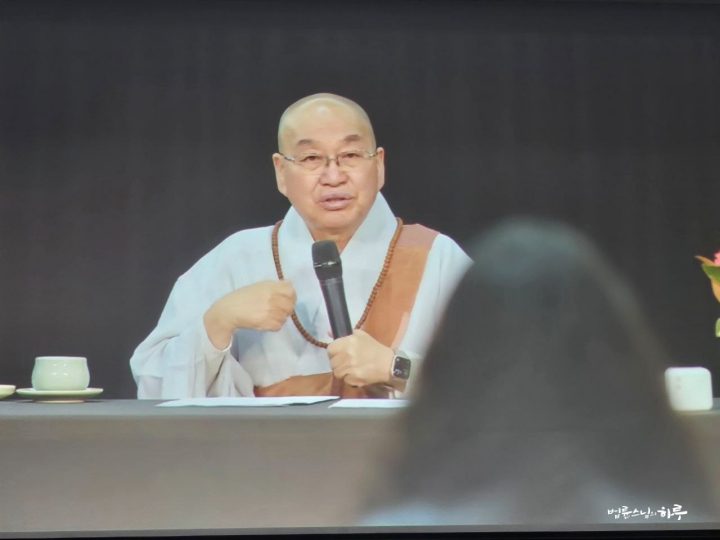
First, you must not scold the child. Scolding causes psychological wounds and suppression. Raising your voice, hitting, or scolding constitutes abuse. While arguments or conflicts between adults may just be disagreements, for children, they all become wounds. Just as urine can be fertilizer for a tree but kills young sprouts, it becomes poison for children. When parents drink, fight, hit, and scold children during their childhood, these experiences remain as lifelong scars. This is why we must not abuse children.
Second, parents must set an example. This doesn’t mean you should let children develop bad habits without intervention. However, if a child doesn’t understand after being taught ten times, don’t scold them—teach them an eleventh time. Not knowing is what makes them children. If they knew everything, they wouldn’t be children. That’s why we must set an example.
Why do children leave home after adolescence or turn their backs on their parents as adults, refusing to meet them? While there may be practical reasons like being denied money, most often it’s due to childhood wounds. Yet parents often don’t realize this. They don’t know what wounds they’ve inflicted. They think, ‘I did it all for your own good!’
Adolescence is the transitional period from childhood to adulthood. Physically, secondary sexual characteristics appear, voices change, and facial hair may grow. Mentally, they want to become their own masters. They’ve passed the stage of learning by following and now want to try things on their own. But mothers see this from the perspective of ‘not listening.’ What happens if we block children from trying things on their own? They become adults only in body while their minds remain childlike. Then parents must care for them their entire lives. This is why we shouldn’t interfere during adolescence. 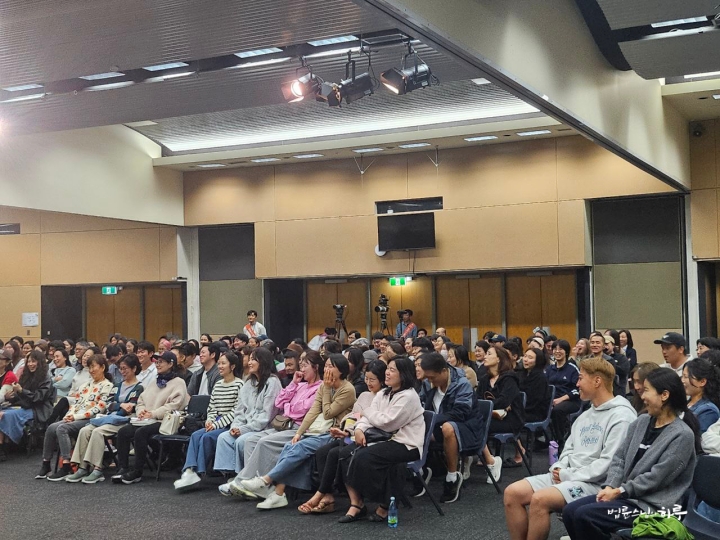
Rather than viewing it as ‘not listening,’ you should see it from the perspective of ‘trying to become an adult.’ You need to gradually treat them as adults. You must respect what the child says and have conversations with them. You shouldn’t give orders or commands. When discussing anything, don’t conclude that the child is wrong; instead, ask why they think that way. This is the process of becoming an adult. It’s also natural for them to develop an interest in the opposite sex during this period. You should see it as a normal growth process rather than approaching it as ‘not studying and being distracted by girls.’ If we had grown up like animals in nature, this would be the time when they’re becoming adults.
What about when they become adults? You need to withdraw all interference and cut the emotional cord. While the relationship is that of guardian and dependent when the child is young, at this stage, it should become a social relationship between person and person, that is, adult and adult. If this happens, there can be no conflict between parents and children. In the natural animal world, there are no conflicts between parents and offspring. This is all a psychological issue. It’s unnatural. It’s not knowing the principles of nature.
Just because someone graduated from early childhood education doesn’t mean they’ll necessarily raise children well. Children should be raised naturally. When a child asks for food, the mother just needs to give them food. Carrying the child on your back to work provides much more psychological stability for the child than leaving them behind to go to work. The baby should be the mother’s number one task and top priority. What if money, work, and promotion are the mother’s priorities and the child comes second? If you calculate it in terms of money and leave the child with someone else, the child develops ‘love deficiency syndrome’ with something unfulfilled in their heart. This can become the cause of various mental illnesses they experience later in life.
You shouldn’t raise children with your head. You need to raise them with your heart. Discovering a child’s talents and developing their specialties should be left to teachers. But nowadays, mothers don’t play the role of mothers and mainly try to play the role of teachers. Why is that? Because mothers are highly educated. My mother didn’t even finish elementary school. So she didn’t tell us what to do except for feeding us. Because she didn’t know much. A child’s education and career path should be discussed with teachers and seniors. But because you’re highly educated and know a lot, you try to be involved in everything from your child’s college to marriage. You’re trying to play the role of a teacher or coach, not a parent. Today’s children only have coaches and neighborhood ladies, not parents. That’s why most children are smart but develop psychological anxiety and deficiencies, and the number of children with mental illnesses is rapidly increasing. 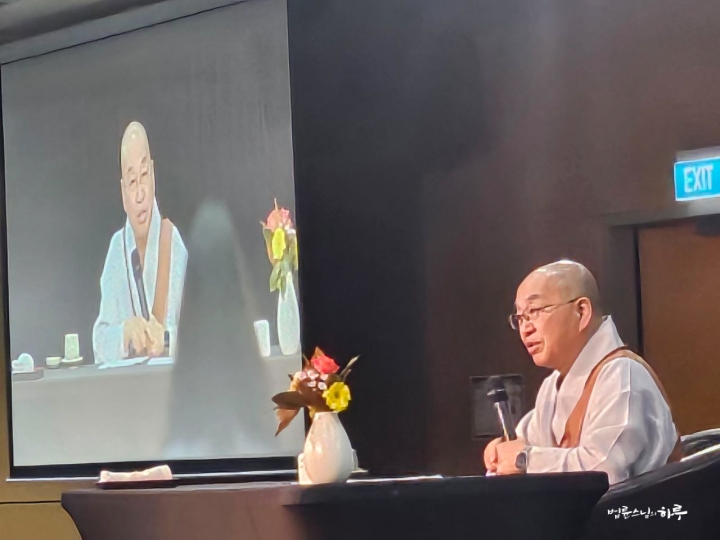
You shouldn’t raise children the way you do. Just feed them, hug them, and if they want something that you think they shouldn’t have, don’t give in even if they cry. Don’t scold them; just don’t give them what they want. Many parents scold their children harshly, and then give them whatever they ask for. By scolding, you create psychological suppression, and by giving in to their demands, you spoil them. In the Gyeongsang dialect, we call this ‘dibi jjonda’ (twisting things). When children are young, they need warm care, but parents neglect them. During adolescence, when parents should observe from a distance, they suddenly try to control everything. This is all ‘dibi jjonda.’ In Buddhist terms, it’s called jeondomomsang (顚倒夢想), meaning doing things backwards.
Children should be raised naturally. If you don’t know what to do, try raising a swallow at home. Watch how a swallow treats its chicks, and you’ll quickly understand. When you overthink parenting like you do, it complicates the child’s mind. If they fall, help them up. If they get hurt, treat their wounds. If you forbid them from using the swing because they might get hurt, they’ll never learn to swing. Learning always involves some risk. A parent’s role isn’t to prevent them from swinging, but to quickly take them to the hospital if they fall. You need to watch over them like that. If parents hold the swing’s rope, children can’t learn to swing. You shouldn’t overprotect them, nor should you neglect them. Many parents do both overprotection and neglect simultaneously. Mothers just need to live their own lives happily. If you don’t abuse or neglect your children, and live your life joyfully, children will naturally learn and become happy. I’ve written a book called ‘Mother’s Lesson.’ I recommend you read it.
If you think like that, it’s difficult to be a mother. Think about your childhood. How would you have wanted your parents to treat you? Even when you did something wrong, you felt bad when your mother scolded you, right? But if they let wrongdoing slide, you develop bad habits. So don’t scold; just don’t give in to wrong demands. When a child refuses to eat, mothers scold and then serve the meal anyway. In that case, don’t scold—just clear the table. But that’s hard to do, isn’t it? When the child asks for food again, give it to them. There’s no need to scold.
Parents have ten or twenty cards to play when dealing with children—they’re in an advantageous position. Children have no way to respond, do they? So why do parents raise their voices? That’s like a dog barking—it’s what someone in a disadvantageous position does.”
“Thank you. I understand well.”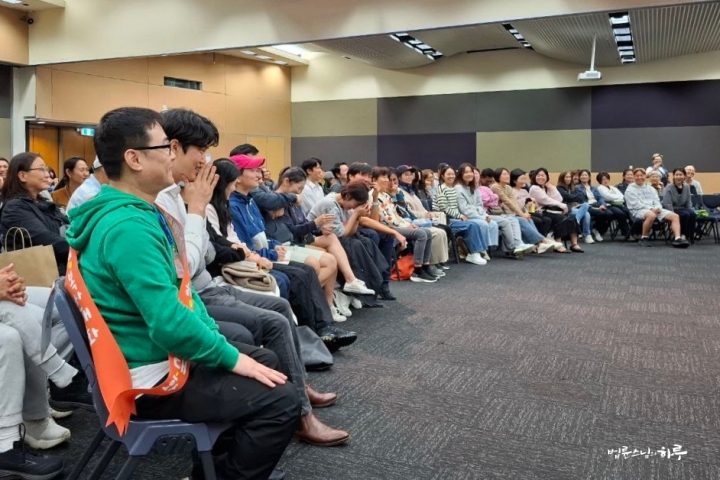
Questions continued one after another.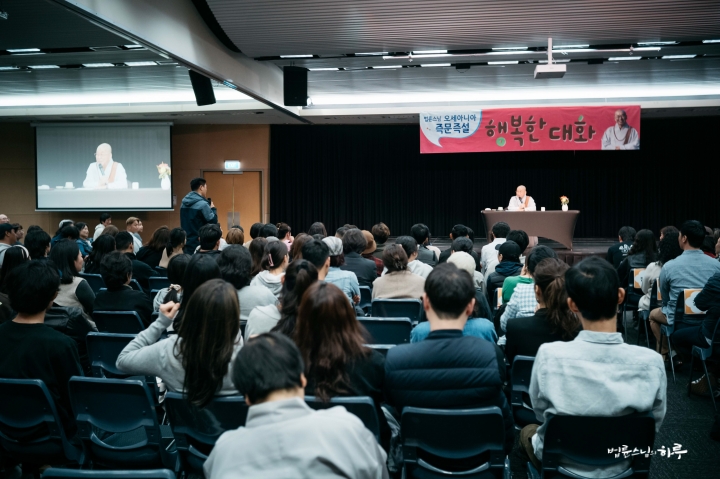
It’s difficult to prioritize between what I want to do and what I need to do. Which should I do first in such situations?
Even after sharing my worries with friends, I can’t find solutions, so I’ve developed a habit of bottling up my concerns. How can I deal with stress in a healthy way?
I’m a tattoo artist. I’m troubled because I can’t honestly tell my parents what my profession is.
How can I reduce the anxiety that increases as I get older?
I want to have honest conversations with my son about his English grades and marriage, but I’m not good with words. How can I communicate better with my son?
After my father passed away, my sympathy for my mother who lives alone has grown. I want to find a way to relieve the obsession and responsibility of supporting my mother.
When experiencing racial discrimination, how can a father show his children a wise response?
My colleague talks too much, and it’s hard to listen. How should I deal with someone who talks excessively?
Racial discrimination is increasing at my child’s school. I want to give my child wise solutions.
Is Korean reunification becoming more distant now? When might reunification be possible?
Negative thoughts arise easily, and I can’t control myself when I’m angry. How can I view situations more positively?
After answering all the questions, Sunim gave closing remarks.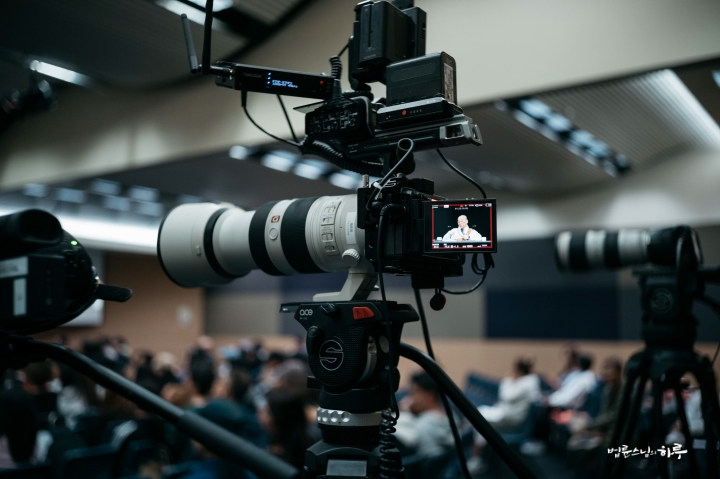
“My concern is how happily you live. Whether you have a high position, make lots of money, are married or not—these aren’t my concerns. I think what’s important is ‘Can you live without anguish and stress while you’re alive?’ There is such a path, and I’m sharing the perspective of walking that path. If you want to know ‘how to make money,’ ask elsewhere. I have little interest in that and don’t get involved.
Anyone, under any conditions—whether missing an arm or blind in one eye—can live without anguish and more comfortably than now, even with such conditions. We are meant to live that way. Walking this path is what we call practice. It’s not religion or faith. It’s a principle and law. So I hope all of you will take an interest in practice and continue studying the mind steadily.”
After finishing the dialogue, it was well past 9 PM. Sunim immediately held a book signing on stage. Many people lined up to receive Sunim’s autograph and express their gratitude.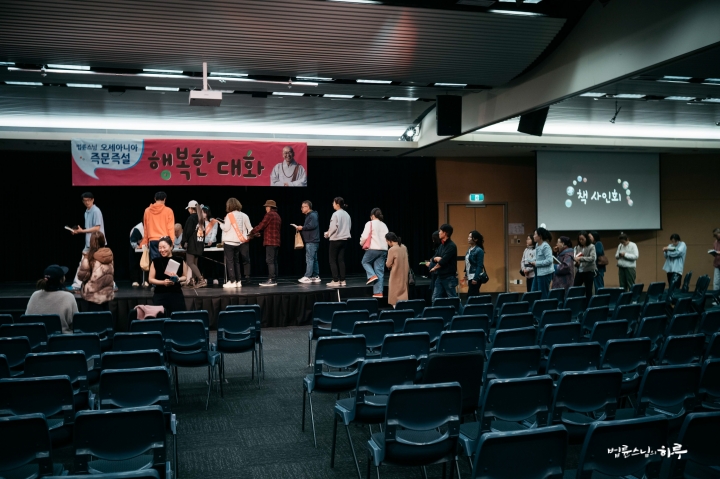
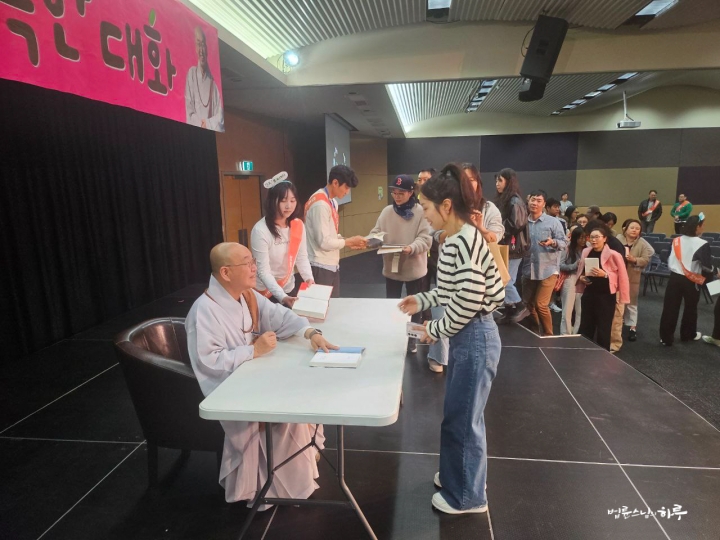
After the book signing, Sunim took a commemorative photo with the volunteers who prepared the lecture.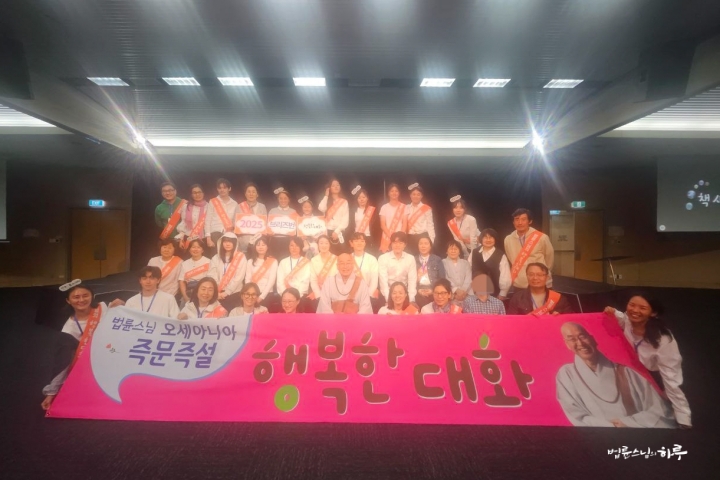
Sunim presented a book to Shim Chun-jae, who coordinated today’s lecture, as a token of gratitude.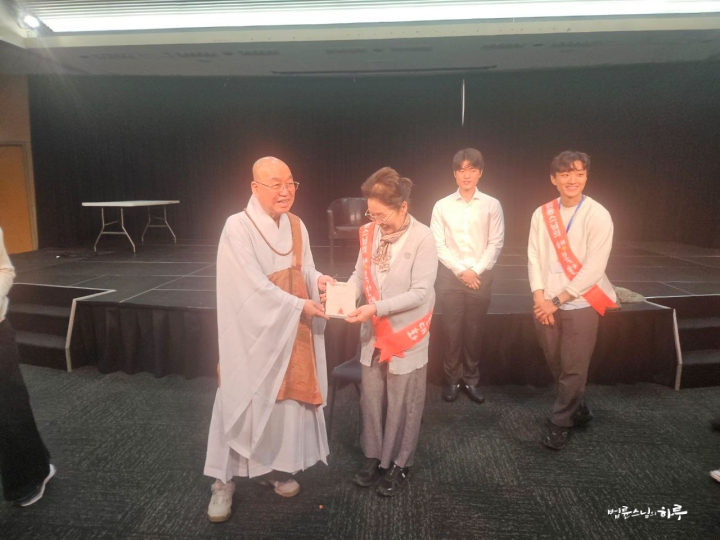
Sunim also gave a book to Song Eun-jin, who served as deputy coordinator. She mentioned that her older sister would be coordinating tomorrow’s Melbourne lecture.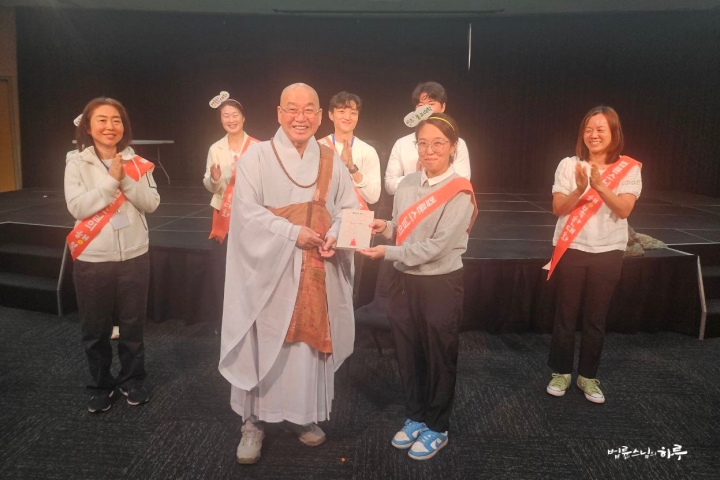
After all the audience members left the venue, Sunim exchanged greetings with the volunteers and departed for the accommodation. The volunteers had a mindful sharing session with Dharma Teacher Myodeok.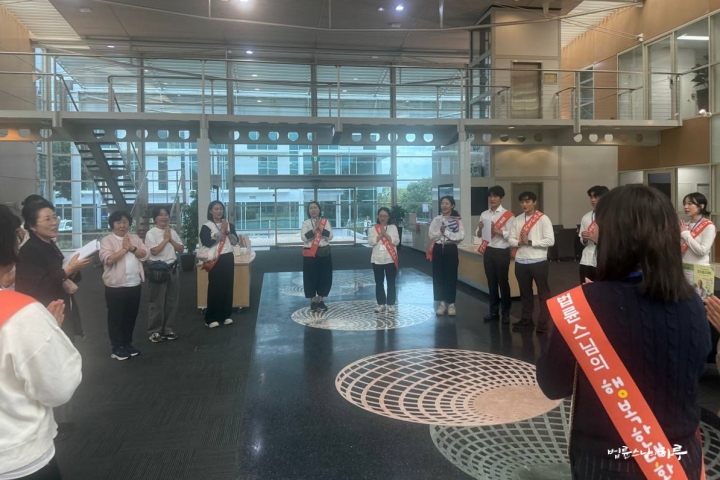
“I used to just attend Venerable Pomnyun’s Dharma talks, but today I volunteered for the first time. After experiencing firsthand how many people work hard behind the scenes, I feel motivated to participate more in the future.”
“I volunteered for the first time managing outdoor parking. I didn’t realize from YouTube how many people work so hard to make one lecture happen. I was amazed and truly grateful to be part of it.”
“Meeting Jungto Society helped me overcome great suffering, and through the Dharma, my life has become happy. Now my children volunteer together with me. I hope others can also find happiness through the Dharma, just like we did.”
Sunim arrived at the accommodation after 10 PM.
Tomorrow morning, Sunim will depart from Brisbane Airport to Melbourne and continue with the fourth Dharma Q&A lecture of the Oceania tour.





